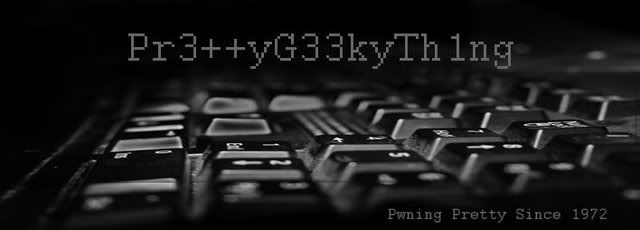I get to work every morning before seven, work through lunch, then leave at four pm. This gets me home ahead of most of the traffic in time to see my family before my daughter's bedtime and, almost as importantly, before I snap.
I worked late yesterday because the Business Continuity consultant scheduled a meeting between four and five. I guess that doesn't really count as work, because it was a meeting. A meeting is like work, but much, much worse.
I suspect I was visibly bitter about being there for another high-level meeting.
I may have told the people that got there in advance of the consultant that if I saw another flow chart I'd probably need to telecommute from prison for the rest of the project.
For the first forty-five minutes, the meeting had nothing to do with me at all. The communications team confirmed the theories my team had lined out in an earlier meeting and I checked my GMail account on my BlackBerry.
Then, the consultant turned on me, and what had been a high-level, flowchart-type meeting became a full technical analysis of our Disaster Recovery implementation for Citrix.
I answered the first few questions as the others had about their areas of expertise, but the questions continued.
Data recovery, user connectivity, application availability and worst-case scenarios all came up until I realized high-level analysis was no longer the order of the day.
"Currently, if we lose a server our users will feel it as each server is unique in the applications it hosts. Under the plan I have suggested and am implementing, each server will have a twin in our disaster recovery location, segregated by what Citrix refers to as a zone.
"In the event the primary zone, our current farm, is struck by a meteor or boarded by pirates, all traffic will be routed immediately to the other zone. The applications will be available constantly."
She asked if they would be maintained in the same state as the current servers and I told her that they would have to be, as I planned to route Canadian and Latin American users there at all times to reduce the current load on our production servers. If they had old data, I'd hear about it.
She asked if there was anything I needed to do to make the switch happen and I replied that within the first 72 hours I'd need to re-direct the database server on the back-end to one at the Disaster Recovery site.
Without being prompted I closed with, "It's very technical and I don't think this is the meeting to discuss the details. Let me assure you though, we are extremely lucky to have me."
My recommendation to all of you, should the opportunity arise, is to do your best to end a conversation that way.
I haven't ever felt anything quite like it, though I suspect it is akin to getting past all of Regis Philbin's "Are you sure?" crap to confirm your final answer and to not only be correct, but so correct that someone writes a book about your answer being, quite possibly, the best answer of all answers to every question ever asked and someone eventually putting your likeness on a T-Shirt sold at Hot Topic.
That made it almost worth the 2+ hour drive home through Houston traffic.
Subscribe to:
Post Comments (Atom)







No comments:
Post a Comment